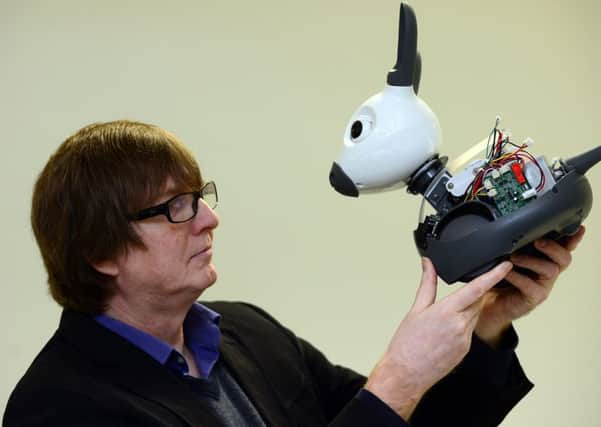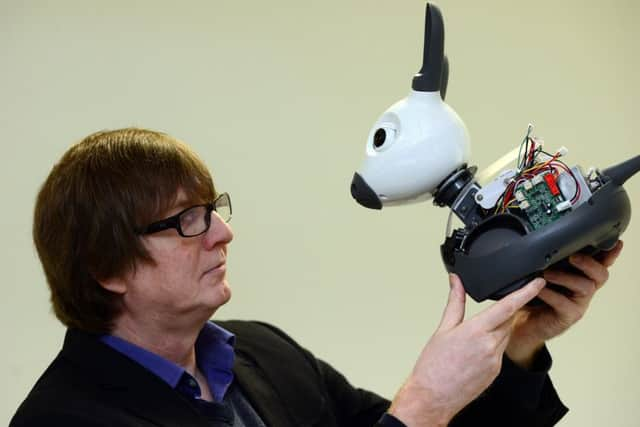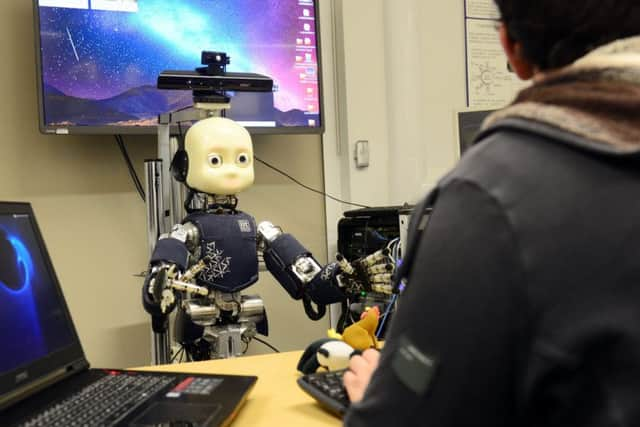The rise of the robots - is it a brave new world?


Meet MiRo. He, or she if you prefer, is a pet robot, or cobot (collaborative robot) to be precise.
It has dog-like features and lights up when you stroke it and though it might not be man’s new ‘best friend’ any time soon, it could well become a familiar sight in the coming years. “It’s a prototype of the companion robots that people might have in the future in their homes,” says Tony Prescott, Director of Sheffield Robotics, where MiRo was developed.
Advertisement
Hide AdAdvertisement
Hide AdIt’s more than just a substitute pet, though. “Older people often move into a care home because they’re worried about falling and that no one will see them. But a robot like this could monitor your movements and remind you to take your pills,” says Prof Prescott.


As well as enabling people to live independently for longer it could also help reduce the future social care bill and is just one example of how robots are revolutionising the way we live.
There was a time when robots and AI (Artificial Intelligence) were confined to sci-fi films and dystopian novels. But not any more. Reality is catching up.
Ever since the Luddites began smashing up their automated looms 200 years ago mechanisation has been putting people out of work. But whereas in the past this change took place slowly over decades, and sometimes even centuries, it has now accelerated at a bewildering pace.
Advertisement
Hide AdAdvertisement
Hide AdProfessor Stephen Hawking recently warned that the creation of powerful artificial intelligence will be “either the best, or the worst thing, ever to happen to humanity”, while stories about robot armies and robots taking our jobs have been grabbing the headlines.


In December, the Bank of England’s governor, Mark Carney, warned that 15 million jobs in the UK could be automated due to changes in technology, spawning doom-laden headlines in some of the tabloid press.
But Professor Prescott who is based at Sheffield Robotics - an ambitious research institute involving the city’s two universities - believes we are on the verge of a new industrial revolution.
“We’re on the cusp of seeing some great changes. We are seeing robots coming out of the factories and enter everyday life more than ever before.”
Advertisement
Hide AdAdvertisement
Hide AdWe’re already starting to see robot vacuum cleaners and robot lawn mowers, while driverless cars are just around the corner and it probably won’t not be long before we see robot porters operating in hospitals.


At the same time advances in AI have underpinned developments in speech recognition that are behind the likes of Amazon Echo and Google Talk. “You can now ask questions and get a sensible reply and we’re getting to the point where you can have machines in your house you can converse with, it’s very exciting,” says Prof Prescott.
But with increasing automation comes concern over jobs. “It’s definitely going to have an impact and it’s AI rather than robots that are putting white collar jobs under threat. It’s not just office jobs, it’s lawyers and even doctors. So rather than giving you a diagnosis themselves a doctor might put your symptoms into an AI and the AI will give you a diagnosis.
“Similarly with a lawyer the whole job of finding case histories is something AIs can do far more effectively. Architects and the job of designing buildings can also now be done by computer programme and as these jobs come under threat people are thinking ‘what will the human role be?’”
Advertisement
Hide AdAdvertisement
Hide AdIn many ways white collar workers are less secure than people doing manual work. Though having said that there are still many jobs we do that robots cannot yet replicate. “Robots are going to be better at repetitive tasks but humans are still better at things that require manipulation. For instance, robot grippers are a long way from producing what we can do with our hands.”


This means that people will still be needed to work in manufacturing for a long time yet.
Agriculture is one industry that might actually benefit from increased mechanisation. “There aren’t enough people who want to do labouring jobs in the agricultural sector and if we don’t have the migrant labour from Eastern Europe there’s a real risk to UK farming which relies on it. So one possibility is to use robots.
“There are already self-driving tractors and we’ll see more of that. People are increasingly using drones so in the future farmers might send a drone out to monitor their herd or their crops.”
Advertisement
Hide AdAdvertisement
Hide AdThe team at Sheffield Robotics is focusing on several key areas of research. One involves finding ways of making drones more autonomous, and another is the field of healthcare and assisted robots and how robots can be used to ease the workload in hospitals.
The third is manufacturing. “Robots currently working in factories tend not to sense the world and they sit behind fences so they don’t bump into you. But the next generation of robots, or cobots, are designed to work more closely with people and that’s an area we’re very interested in,” says Prof Prescott.
The whole point of having robots in the first place is to make our lives easier, otherwise there’s no point having them. But there is concern over how our future relationship with them will unfold.
“There’s a lot of protests about globalisation and these are going to be exaggerated by the impact of AI. We hear people talking about eastern Europeans taking their jobs but actually it’s more likely to be robots.”
Advertisement
Hide AdAdvertisement
Hide AdThey are already part and parcel of our everyday lives and this is only going to continue. “They will appear and people won’t really notice. I think in 10 years time pretty much everyone will have robot vacuum cleaners and we won’t even think of them as robots.”
Fifty years ago the world’s superpowers were engaged in the Space Race and now we’re perhaps seeing the start of a ‘Robotics Race’. “China is building robots faster than we are in the UK, and if we want to be competitive we have to have more automation in manufacturing because we’re behind most of the other G7 countries at the moment.
“The benefit of this is you can reshore some of the manufacturing here. You can do it more cheaply than in China because you won’t have the same labour costs.”
Prof Prescott says Yorkshire can play a big part in this latter day industrial revolution. “Across Sheffield, Leeds and York we’ve got some of the best robotics in the country. So in terms of the next wave of manufacturing and how it’s going to change Yorkshire is leading the way.
Advertisement
Hide AdAdvertisement
Hide Ad“What we would like to see is for Yorkshire and Sheffield to be at the forefront of this next industrial revolution because it is going to happen anyway and either you’re there, or you’re somewhere far behind.
“And, actually, if we get the economics and politics right it’s going to benefit people and we may not have to work as hard in the future.”
Could we get paid for working less?
One of the big concerns over growing automation is the impact it will have on jobs in the next few years.
But there is a belief that this could actually be beneficial. “The positive side of this is that the productivity of robots will increase which should mean we will have to work less,” says Prof Tony Prescott.
Advertisement
Hide AdAdvertisement
Hide AdIt has prompted a debate about the creation of a universal basic income for those whose jobs are affected. “If robots and AIs are generating the wealth then it makes sense to tax those machines and using that to support consumption, and the European Union is already talking about taxing robots.
“There would have to be a new economic model eventually but it’s something being talked about.”